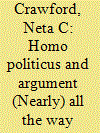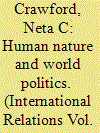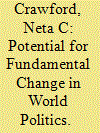|
|
|
Sort Order |
|
|
|
Items / Page
|
|
|
|
|
|
|
| Srl | Item |
| 1 |
ID:
090680


|
|
|
|
|
| Publication |
2009.
|
| Summary/Abstract |
Much theorizing about world politics and many policy recommendations are predicated on a rather thin view of homo politicus, often assuming that humans are rational and self-interested strategic actors and that force is the ultima ratio of politics. This thin notion should be replaced by a richer understanding of homo politicus that includes the characteristic activities of political actors: we fight, we feel, we talk, and we build institutions. This understanding helps illuminate the scope and limits of strategic action, argument and persuasion in world politics in both empirical and normative senses. I describe the spectrum of political action that situates the role of argument and persuasion within the extremes of brute force on one side and mutual communication on the other. I also discuss barriers to argument and communication. Noting the role of argument in this spectrum of international and domestic political practice suggests that it is argument (nearly) all the way down and that the scope of argument can be and in some cases has increased over the longue durée. Coercion, by itself, has a limited role in world politics. The claim that there are distinctive logics of argumentation, strategic action, or appropriateness misses the point. Argument is the glue of politics-its characteristic practice. Understanding politics as argumentation has radical empirical and normative implications for the study and practice of politics.
|
|
|
|
|
|
|
|
|
|
|
|
|
|
|
|
| 2 |
ID:
048434


|
|
|
|
|
| Publication |
Hampshire, macmillan Press, 1999.
|
| Description |
xv, 292p.
|
| Standard Number |
0333725514
|
|
|
|
|
|
|
|
|
|
|
|
Copies: C:1/I:0,R:0,Q:0
Circulation
| Accession# | Call# | Current Location | Status | Policy | Location |
| 041363 | 341.582/CRA 041363 | Main | On Shelf | General | |
|
|
|
|
| 3 |
ID:
090149


|
|
|
|
|
| Publication |
2009.
|
| Summary/Abstract |
While realists acknowledge that their theories of world politics are rooted in specific assumptions about human nature, neorealists tend to discount human nature in favor of an emphasis on systemic forces. Nevertheless neorealism has assumptions about human nature that shape neorealist theorizing. Specifically, in Man, the State, and War and Theory of International Politics, Waltz make essentially the same assumptions about human nature as the realists - that our human natures are fixed, that we cannot trust others, and that decision-makers are rational calculators who seek to promote their narrowly defined self-interests. Moreover, for Waltz, human nature determines world politics as much or more than its anarchic structure. A review of biology, specifically human neuroscience, suggests that these assumptions about human nature, and its relation to world politics, ought to be challenged. Our `natures' are much more complex and flexible than realism and neorealism assumes.
|
|
|
|
|
|
|
|
|
|
|
|
|
|
|
|
| 4 |
ID:
160054


|
|
|
|
|
| Summary/Abstract |
Despite the Realist’s assertion that nothing fundamental changes in world politics, change is the norm in all life and all fields. World politics is no exception. Yes, there are continuities in world politics; they are the persistent, albeit themselves changing, mechanisms that foster fundamental change, the both large and small alterations in the nature of agents, structures, processes, and the content of arguments. Sometimes things change slowly, they evolve. And sometimes radical changes occur in a relatively short period of time; we might think of the latter as phase changes or radical ruptures at tipping points. But often those ruptures have been preceded by decades of slower work by advocates of change toiling in civil societies or specialized communities. Thus, a great deal of effort goes into not only making change but also resisting change.
|
|
|
|
|
|
|
|
|
|
|
|
|
|
|
|
| 5 |
ID:
059318


|
|
|
|
|
| Publication |
Summer-Autumn 2004.
|
|
|
|
|
|
|
|
|
|
|
|
|
|
|
|
| 6 |
ID:
054016


|
|
|
|
|
|
|
|